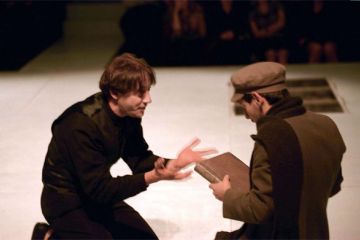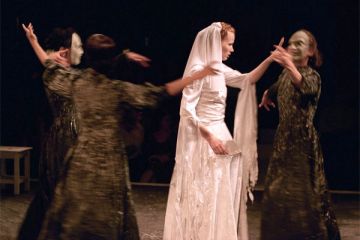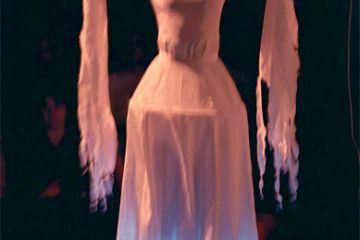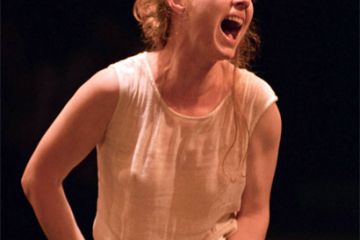After S. Anski
White Fire, Black Fire (DYBBUK)
Studio Performance in the Main Hall
RO

2 hours.
The Mesulah
Miklós Bács
Hannan
Áron Dimény
Lea
Imola Kézdi
Reb Sender
Attila Orbán
Fradde
Réka Csutak
Reb Azriel
József Bíró
Michael
Levente Molnár
Reb Shimshon
Zsolt Bogdán
Henekh
Róbert Laczkó Vass
Gittel
Melinda Kántor
Bassia
Edina M. Fodor
1st Batlen
Ernő Galló
2nd Batlen
Levente Molnár
3rd Batlen
András Buzási
Manashe
Ferenc Sinkó
Nahman
Lehel Salat
Manashe’s Mother
Andrea Kali
xxx
Attila Nagy
xxx
László Szekrényes
xxx
Alpár Fogarasi
directed by
David Zinder dramaturg
Kinga Kelemen set design
Miriam Guretzky costume design
Miriam Guretzky music composed by
Zsolt Lászlóffy choreography
Yael Cramsky masks
Attila Venczel choreographer's assistant
Kinereth Kisch stage manager
Yvonne Nagy prompter
Zsófia Bálint
Miklós Bács
Áron Dimény
Imola Kézdi
Attila Orbán
Réka Csutak
József Bíró
Levente Molnár
Zsolt Bogdán
Róbert Laczkó Vass
Melinda Kántor
Edina M. Fodor
Ernő Galló
Levente Molnár
András Buzási
Ferenc Sinkó
Lehel Salat
Andrea Kali
Attila Nagy
László Szekrényes
Alpár Fogarasi
directed by
David Zinder
Kinga Kelemen
Miriam Guretzky
Miriam Guretzky
Zsolt Lászlóffy
Yael Cramsky
Attila Venczel
Kinereth Kisch
Yvonne Nagy
Zsófia Bálint
Date of the opening: May 17, 2002
Awards:
Romanian Theatre Union (UNITER) - Nominated for the best performance of the year 2002 award
KÉZDI IMOLA - Best actress Award for 2002 (UNITER)
The word dybbuk is the hebrew word for "clinging" (ledavek) or "sticking". According to Hebrew belief, the dybbuk is a restless soul or bad spirit who moves into the body of a living being, and battles with its soul untill the possessed drifts into dementia.
Ansky's take place in 19th century eastern Europe. The play is the tragic story of two lovers, Chanan, a young man absorbed by his studies and by Kabbala, and Leah, the girl chosen to be his wife. When the girl's father breaks his word and marries the girl to another man, Chanan dies. His soul is restless, and moves into Leah's body in order that he and Leah can still be together. Rabbi Asriel tries to exorcise the dybbuk from the anguished Leah, so that the girl can be married to the second man. Leah has to choose between the mundane marriage of duty, and the other-world bond with her dead lover's soul.
Opening date: May 17, 2002.
Running time: 2 hours.
Ansky's take place in 19th century eastern Europe. The play is the tragic story of two lovers, Chanan, a young man absorbed by his studies and by Kabbala, and Leah, the girl chosen to be his wife. When the girl's father breaks his word and marries the girl to another man, Chanan dies. His soul is restless, and moves into Leah's body in order that he and Leah can still be together. Rabbi Asriel tries to exorcise the dybbuk from the anguished Leah, so that the girl can be married to the second man. Leah has to choose between the mundane marriage of duty, and the other-world bond with her dead lover's soul.
Opening date: May 17, 2002.
Running time: 2 hours.















